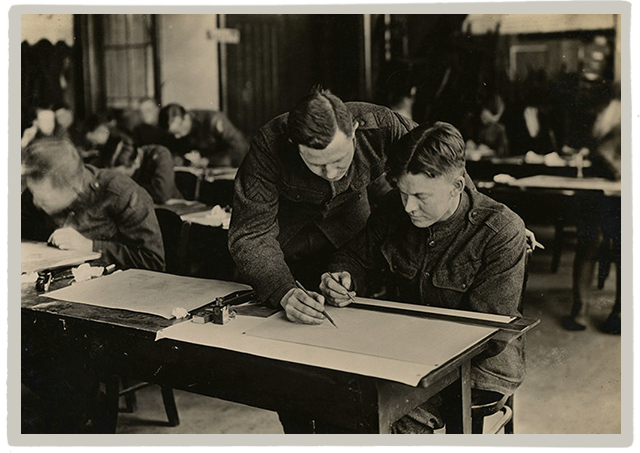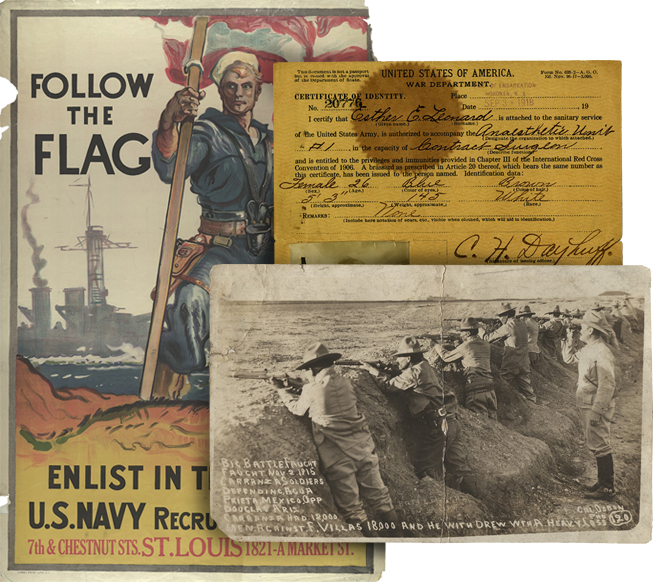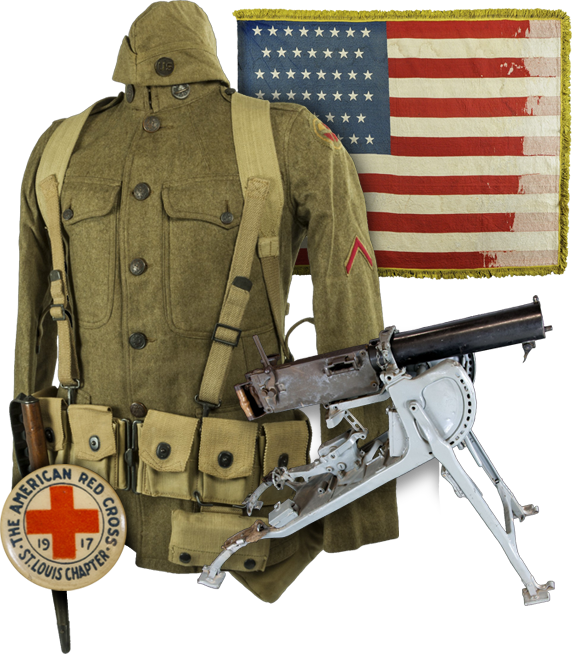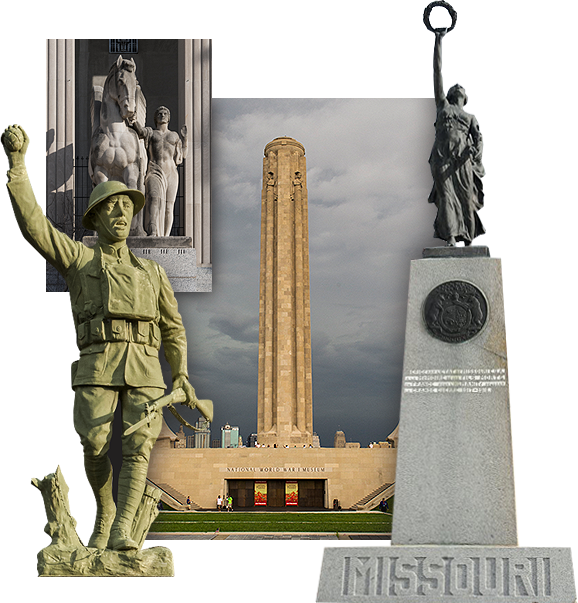Olga Krieger's Manuscript of World War I - 1914 -1918

Transcript
Olga A. Rudd Manuscript of World War I 1914-1918

Transcript
Diary of Olga A. Krieger, Rudd World War 1914-1918. Louise Kenninger Marie Kammeyer Cordelia Ranz Olga Krieger N. Boothby (Adopted) Left for France Thursday May 17, 1917. Left St. Louis, via Big Four at 10 o

Transcript
[page 2] Marie Kammeyer,

Transcript
[page 3] Am now speaking of this city in

Transcript
[page 4] However we all were satisfied that we were ushered into the world at this late date, for had we been here in the early times we might have had a similar fate. The Tower of Jewels is located within these grounds, never before had we seen so valuable collection. The crowns worn by Queens Mary & Elizabeth were here on exhibition as well as many other beautiful ornaments. This afternoon was very well spent and after dinner that evening we went to Queen

Transcript
[page 5] on the Thames near Walton. Here we had a most enjoyable time having been invited for tea which we partook out of doors the weather having been ideal with a sufficient amount of good things to eat, this trip was one we will never forget. Rode some distance in a train and had to almost force ourselves to go but as usual, when an effort is made as this matters always take a smooth course. In the evening we celebrated Miss Ranz

Transcript
[page 6] indifference to a great extent although we could not blame them as we appeared at meal time and no doubt deprived them of a very well earned meal. We enjoyed our dinner and then took a short stroll thru the race course. Of course our camp was beautifull, trees and shrubbery plentiful; geraniums and pansies galore. As we were tired we did not have to be rocked to sleep. For the first three nights we slept in tents which had been occupied by patients on all other occasions. As it is bright as day until 10:30 P.M. we had to keep our tents closed for patients slept in the surrounding ones and being fully aware that nurses were occupying them caused them to snicker and laugh. It was this night that left an impression which will never be removed from our minds. We crawled into beds which had previously been occupied by patients, as we arrived on June 10th. 3 days after the battle of Messines, had taken place, which of course had been a great push, the hospital had been filled but were then evacuating. We slept very soundly this night arose at 9 A.M. for breakfast. We were then told that we could enjoy this day in rest and report for duty June 12th. Our first act then was to go to town,

Transcript
[page 7] While on Alpha I thoroughly enjoyed the time, it was short though sweet the line was entirely surgical, all walking cases and each morning we held clinic hours, that is each patient would come and have his dressings done. When these lines were filled they could accomodate over 200 patients. On Saturday October 6th. at 8 P.M. I went to the medical hut for night duty where I served my term of one month. Here we had nephritics and penetrated chests while it was called medical it was almost entirely surgical. I spent a very pleasant month here but must admit had two wounded patients I will never forget, Corp. Frost and Private Townsley. Both had penetrated chests and were on the Dangerously Ill

Transcript
[page 8] On November 9th. I was assigned to day duty in the surgical hut or #6. Here there were only fractured femurs and knee joints, consequently the Albot and Sin Claire frames were used the place looked more like a menagerie than a ward and the patients more like monkeys than ever. Patients usually remained here for months as clean cases are very rare and bone requires a long time to knit; deaths here were few compared with the dreadful cases they are; hemorrhages were frequent due to secondary causes; the turniquet was the most valuable article in the place, in fact it was a most desirable one for a belt or la

Transcript
[page 9] After three weeks in the medical hut I was booked for night duty on G line. This was during the big push at Amiens and we surely were busy. The first weeks of night duty I was relief nurse, that is I had a different line or hut each night. On Monday, I spent a very quiet night on F line (medical). Tuesday on E line and on this morn at 4:30 A.M. admitted 40 patients, all gassed. Each and everyone of them had their eyes bandaged, were unable to see and surely presented the most pathetic sight one should ever hope to see. Wednesday night I spent in hut #1, where several of these cases (serious) had been transferred and one of these individuals, a fine husky man of about 30 years of age, went to the bad, death of course claiming him, after a struggle of several hours. He however was only one of a number, there were several who died from the result of this dreadful gas. G line had been a shell shock line, but was at once a surgical ward, and was termed as being for light surgical cases although we had everything in it from a scratch on the finger to amputations of arms and limbs. I remember one case which was a double amputation, the patient having lost arm and leg. There was a convoy in and out every hour, beds could not be changed as patients were brought in as quickly as they were discharged, thus the beds did not even get cold much less changed. John Graham, was my night wardmaster, he was very agreeable. On April 6th. my night duty was at an end, had two days and then went back to day duty, on the morning of the 9th. I was posted for hut #2, (penetrated chests) where I remained on week, when I was transferred to one of the Nissen Huts. Here Miss Ranz, was my head nurse, Captain Spivy my M.O. and tell you we had an awful time, as the Capt. seemed almost impossible to me. Poor Ranz, would sometimes declare she would be driven crazy. I would at intervals become so irritable that I several times thought I was going to the office and tell miss Taylor, that I would not work in that hut, although had it not been for Ranz, I would never had been tolerant, though for her sake I tried to be and remained there just three months during which time I became accostomed to the M.O. or he to me. At any rate we remained friends, he went on his leave and his place was taken by Dr. Horst, who remained in charge ever after. On August 2nd. I left Rouen, with Marie Kammeyer, for our leave to Barritz, a sea coast town about 20 or 25 miles from the Spanish boarder. We left our town at 8:45 A.M. arriving in Paris at 1 P.M. we then rode to Hotel D

Transcript
[page 10] ment. These three

Transcript
[page 11] Never had we ever tasted the splendid orangeades, we did in this town and Harry Jones, and Lt. Heider, left an impression which will never vanish. Upon leaving

Transcript
[page 12] Fighting however continued at a vicious rate for over another month, the Allies coming out victorious; war however was becoming more gruesome with the passing of each day, for while we were not at the front and had no idea of what a battlefield or trenches were, we had the results to convince us that such was no place for

Transcript
[page 13] scouts and the men just treated us loyally. Oh! if the office ever got next, they had to admit that something had been pulled off sucessfully, for had any one suspected the doings, we would have certainly been interrupted, for it was a great pleasure to give

Transcript
[page 14] Many of these patients told of wierd tales, others had been treated with more consideration, but however, the trials and tribulations of the German population must have been appaling. One patient, a Canadian of a most pleasant personality, and intelligent as well, who had been a prisoner 8 months, spoke the German Language most fluently and read it very well and stated that Germany certainly had suffered most dreadfully. They did not get food for they were English subjects, but the Boch, did not have it to give, their own people were doing without. They merely told the prisoners that they had not food therefore could not give it. All of the German people between the ages of 6 and 67 had to work, regardless of station in life. Imagine patients in bed with starched bosom shirts and cuffs, a donation from the upper

Transcript
[page 15] composed a party and we all had a real agreeable time. The next day Mr. Kemp, his friend, another Kentuckian, Marie and myself, took a trip to Cimez, a small suberb town and picked oranges from the trees. We visited the Roman Arena, and after lunch we visited the chiff and cemetary, and in the evening we went to a dance at the Y.M.C.A. We always had splendid times here and attended these dances nightly. On Tuesday we took a trip to Monoco Monte Carlo Menton, a beautiful trip, where we had our photos taken with an Algerian Guard, after which we had lunch at Menton, at one of the hotels at the seashore. The Meditteranean was very wild, therefore was a pretty scene. We arrived at Nice, at 4 P.M. and spent an hour or two at the

Transcript
[page 16] January 20th. my night duty term expired, there were 32 patients in the two huts 1 and 2, and these were evacuated January 22nd. leaving a hospital but no patients. This night duty term was different than any I have ever had before. There were no hemmorrhages to fear, no delirium form the

Transcript
[page 17] The second night James McFarland, who was a pneumonia case jumped from the third story window, while dilirious and landed on his feet, but was uninjured internally, dying the next morning. This happened just 20 minutes before I came on duty at 6:40 P.M. although very unfortionate I was thankful I had escaped it. We stayed at the Hotel Plage, while at Carnac, and we had very good meals and spent 9 weeks at this summer resort. We were about 100 feet from the sea and were very comfortable. We had moving picture shows at night and minstrell show or the Y.M.C.A. would give us a concert party. Lts. Dyler of Arkansas, and Williams of Oregon, made all attempts to make our stay pleasant and Col. Blanchard of hospital centre #136 of Vannes, sent passes daily for auto trips. One of the nicest trips taken, was to Josslin, a distance of about 60 kilos. Here we visited the chateau which had been occupied by the Duke of Rohan, who had been killed in the battle of the Somme, having been twice wounded previously to the time he was killed. The beautiful chateau is still occupied by the Duchess, who at this time was still in Paris, with her two children. The home was beautiful throughout, architecture and paintings galore. We also visited the underground dungeon, in which prisoners of the royalty had been confined -- again I was thankful that I was issued into the world at this late date. There were many beautiful places too numerous to mention, but this trip was one I will never forget, April 5, 1919. Several of our nurses went in swimming daily, but I for one never took part and on the morning of April 5th. we departed from Carnac, after a stay of 9 weeks and two days. We rode to Auray a distance of 11 miles, where we boarded an ambulance train. 495 nurses were convoyed to Brest, arriving there at midnight. We were met by Major Kopple, who escorted us to our ambulances, which convoyed us to camp. When we arrived here we received our checks with hut numbers on some, registered and then followed a seargent, who took us to our quarters. Brest is a large military centre and after walking about three blocks, found ourselves in our rooms in

Transcript
[page 18] This was on Thursday April 10th. We were convoyed to the wharf via ambulances where we said

Transcript
[page 19] to our huts, tuck ourselves in our covers and sleep as long as we were permitted, until the bugle sounded revielle at 6:30 A.M. when we would jump out of our bunks and prepare for our days work. My trip to Amiens -- Devastations. We left camp at 6:15 A.M. Friday January 23rd. 1919, there were 13 in number. We left in an automobile truck and had a break down almost a mile from our station. We walked the remainder of the way and purchased our tickets costing two francs (equal to about 40 cents) after having a disagreement with the French girl at the ticket window, we got a third class ticket as no others were obtainable. Misses Davidson, Fabick and I were on this tarp, we traveled in a compartment with three French privates We had a pound of chocolates which we divided with our French aquaintances, of course this surely made a hit with them, (I mean the chocolates not us). It was pretty cold, we had no heat and the windows were broken, so as to keep warm I sat on my feet and in this way I was quite comfortable. The Frenchmen only traveled a short distance and their places were taken by an Australian and a Tommie, who were quite interesting. We arrived at our destination at 1:45 P.M. where we at once proceeded to the Universe Hotel. We asked for rooms, but as some were unobtainable, being hungry, we at once decided to get a meal. We ordered our lunch which consisted of steak, French fried potatoes, peas coffee and bread, which cost us 35 francs. We left after our appetite had been appeased and went next door to the Hotel Du Rhu, where we obtained our room. We rested one hour and then went to the A.P.M. (American Provo Marshall) and registered after which we attended an English concert party from 5:30 to 7:30 P.M. The programme was very good and after the concert we had our dinner at the hotel, which was a most delicious meal, if it did cost 30 francs, for the three of us. Please don

Transcript
[page 20] who was going to Perrone, but as Brittineaux, was considered the most prominent of the two towns, secondly because the

Transcript
[page 21] The Army Alpahbet (Rhymes of a

Transcript
[page 22] J is for Jack with his kilt and his tam, You asked him a question and he

Transcript
[page 23] R is for rumors- I have heard and they do say, We are moving-Right Away, Ask the M.O

Transcript
Gone but not forgotten Americans of Cleveland Ohio and St. Louis units stationed in France June 1917 - [February] 1919 at Rouen France. Expired [October] 21st 1917. Pte Simpson, Sgt. Evatt & Corp. Sheldon Murray having died of the

Details
| Title | Olga Krieger's Manuscript of World War I - 1914 -1918 |
| Creator | Krieger, Olga |
| Source | Krieger, Olga. Manuscript. Olga Krieger Papers. 1917-1919. PC/PC127. Bernard Becker Medical Library Archives, Washington University School of Medicine, St. Louis, Missouri. |
| Description | Olga A. Krieger Rudd (1884-1973) was a Red Cross Nurse who worked with Base Hospital 21 in Rouen, France, during WWI. A graduate of Lutheran Hospital, she and three other nurses left St. Louis on May 17, 1917 and returned in April 23, 1919. One of these nurses, Marie Kammeyer, was a classmate at Lutheran Hospital. Olga A. Krieger worked as a nurse after the war until she married Robert Rudd at the age of 39. Collection consists of a diary that Kreiger wrote during her tour of duty (original and duplicate). The diary is typed and is titled |
| Subject LCSH | United States. Army. Base Hospital 21; World War, 1914-1918--War work--Red Cross; World War, 1914-1918--War work--Women; Amiens, Battle of, Amiens, France, 1918; World War, 1914-1918--Medical care--United States; World War, 1914-1918--Casualties; World Wa |
| Subject Local | WWI; World War I; United States. Army. Base Hospitals |
| Site Accession Number | PC/PC127 |
| Contributing Institution | Washington University Libraries, Department of Special Collections |
| Copy Request | Transmission or reproduction of items on these pages beyond those allowed by fair use requires the written permission of the Washington University Libraries, Department of Special Collections: spec@wumail.wustl.edu or (314) 935-5495. |
| Rights | Researchers should contact the Washington University Libraries, Department of Special Collections for permission to use collections, images, or online content at: spec@wumail.wustl.edu or (314) 935-5495. If permission for use is given, it is given on behalf of the Washington University Libraries, Department of Special Collections as owner of the physical items and is not intended to include or imply permission of the copyright holder which must be obtained by the user. The Washington University Libraries cannot be assumed to hold the literary rights to the items in the Department of Special Collections. When necessary, it is the responsibility of the user to secure proper permission from the copyright holder to quote such materials. |
| Date Original | 1917-1919 |
| Language | English |



